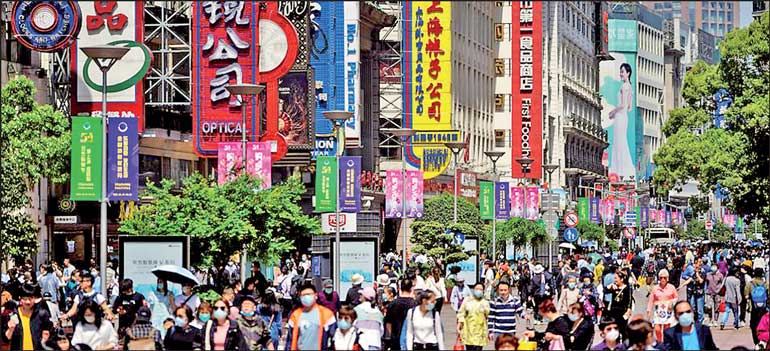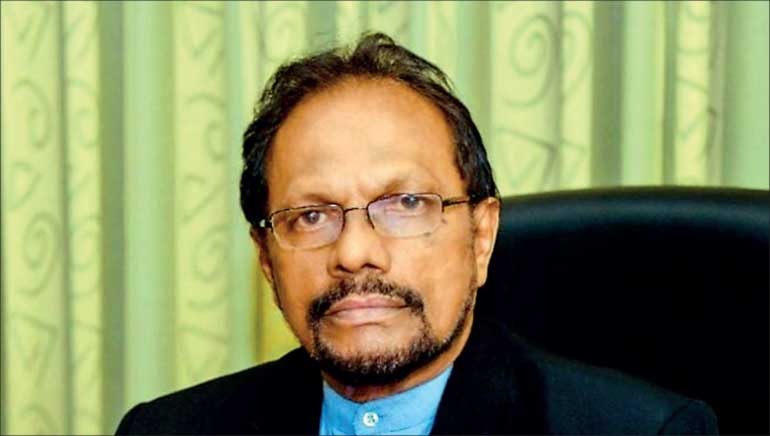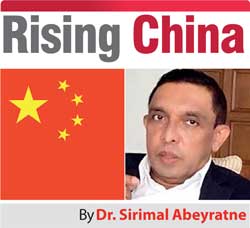Saturday Feb 14, 2026
Saturday Feb 14, 2026
Wednesday, 9 February 2022 00:00 - - {{hitsCtrl.values.hits}}

The ‘disciplined population’ of China has been instrumental in bringing the Chinese economy
to success

Department of Government Information Director General Mohan Samaranayake
This article is based on the interview with Department of Government Information Director General Mohan Samaranayake on ‘Rising China and Lessons for Sri Lanka’. The interview series was launched by the Veemansa Initiative – an independent think tank in the areas of economic, political and social issues. Through this interview series, Veemansa brings about the views of intellectuals and experts on various dimensions of the miraculous development experience of China, by drawing lessons, parallels and prospects for Sri Lanka.
Rising China has transformed the world into a ‘new international order’. International order, whether it is new or old, refers to the nature and structure of the relations of a nation with the rest of the world, covering economic, political, social and cultural aspects. The former international order collapsed in the early 1990s along with the collapse of the socialist states.
covering economic, political, social and cultural aspects. The former international order collapsed in the early 1990s along with the collapse of the socialist states.
Why is China in the centre of the emerging new international economic order? Chinese influence and impact on the world order are substantial due to its second largest economy in the world which has been growing fast. The country is big too in terms of population and geographical size. It has nuclear power, while it was the third country to send spacecraft after the US and the USSR.
‘A century of humiliation’
Historically China was an influential nation as well as a major innovator in the world. As the economist Paul Barron in 1957 said, in the year 1800 China’s industrial output was 33% of the world, which has declined to 6% by 1900 and further to 3% in 1950. In the words of Mao Zedong, it was “after a century of humiliation, China stood up with its revolution” in 1948. People’s Republic of China (PRC) or the Communist China was established in 1948 under the leadership of Mao Zedong who ruled China since then as the Chairman of the Chinese Communist Party until his death in 1976.
Even though this was a period of impoverishment and starvation for millions of the Chinese people as many would like to quote it, China’s literacy and health standards improved vastly. This is why the modern policy reforms began in 1978 under its new leader Deng Xiaoping who said, ‘pauperism is not socialism or communism’. He initiated policy reforms opening the Chinese economy for international trade and investment which paved the way for China to grow fast as a world economic power. The reforms have also been seen by many Marxists as well as others as a ‘triumph victory of capitalist order’.
Preparation for change
In February 2021, the Chinese Government declared that it has eliminated the country’s extreme poverty. It was a fast-growing and fast-changing country. Once the UN Secretary General, Antonio Guterres said, “Every time when I visit here, I am stunned by the speed of change and progress in China.”
It was not just the reforms that paved the way for the success of China. After the 1948 revolution China laid the foundation on which 30 years later 1978 reforms were adopted, and the modern economic power was constructed in China without a major interruption. India too has laid a similar foundation from the time of its first Prime Minister Jawaharlal Nehru up to 1991, in order to become an influential economy in the world order.
The second feature underlying the Chinese success story is that China was consistent in its drive towards a global economic powerhouse. Sri Lanka received Independence in 1948, but throughout when the government changed almost everything changed so that there was no consistency.
Disciplined workforce
The third feature of the Chinese success story is the ‘disciplined population’ of China, which has been instrumental in bringing the Chinese economy to success. In fact, it has been a result of the nation’s Communist rule in the past. However, success does not mean at all that it was merely a smooth and rapid progress as there were many instances of failures. According to some analysts, Mao’s cultural revolution was disastrous too! However, when he initiated the cultural revolution, there were millions of followers.
Likewise, when the Chinese government initiated modern policy reforms, people fell in line with the government unlike in our country. One of the most recent examples is the Chinese government’s ability to control the spread of the COVID-19 pandemic. It was in China that the virus originated; but even having had no prior knowledge about the virus and of its danger, China was able to control its spread because people were disciplined and followed the government directives.
The fourth point underlying the Chinese success story is its pragmatism in policymaking. After 1978 policy reforms, China dropped policy perceptions based on dogmatic and ideological positions and adopted practical approaches to its whole program of policymaking according to changing domestic and world conditions.
Rivalry in the region
When China is emerging as a world economic power as well as a considerable military power in the world, it is understandable that the dominant position of the traditional powerhouses begins to fall apart. For instance, in 1950 the US accounted for about 50% of the world output, which has now declined to little more than 20%. As a result, there is geopolitical power rivalry emerging in the world while our own region – the Indian Ocean – has been one of the focal points of this power rivalry. Two of the recent examples are the nuclear agreement of the US, the UK and Australia and the defence dialogue arrangement of the US, Japan, Australia and India.
It is needless to say that Sri Lanka is in the middle of this power rivalry which has impacted upon the country. What Sri Lanka should do is to maintain its traditional, non-aligned and neutral foreign policy with the rest of the world, without falling into one side. Otherwise, Sri Lanka would be in a difficult impasse in the world polity as it has happened in some other countries.
(The writer is a Professor in Economics at the University of Colombo who conducted the interview series on Rising China.)